NEWYou can now listen to Fox News articles!
A Minnesota federal court judge presiding over the case against three former Minneapolis police officers accused of violating George Floyd’s civil rights during his May 2020 arrest and death delivered jury instructions on Wednesday morning before the panel began deliberating the trio’s fate.
The jury, which appeared to consist of all-White panelists, heard nearly a month’s worth of arguments and testimony surrounding former Officers J. Alexander Kueng’s, Thomas Lane’s and Tou Thao’s behavior and response to the May 25, 2020, arrest involving Floyd, a 46-year-old Black man who later died.
At the start of the trial, U.S. District Judge Paul A. Magnuson selected a total of 18 jurors, including six alternates. As of Wednesday, 15 people remained — 12 who would deliberate and three alternates.
The three are charged with depriving Floyd of his right to medical care when the most senior officer at the scene, Derek Chauvin, pressed his knee into Floyd’s neck for nine and a half minutes as Floyd pleaded for air before going silent. Kueng and Thao are also charged with failing to intervene to stop Chauvin during the May 25, 2020, killing that was captured on bystander video and triggered protests worldwide and a reexamination of racism and policing.
GEORGE FLOYD DEATH: DEFENSE RESTS IN TRIAL AGAINST EX-MINNEAPOLIS POLICE OFFICERS AFTER ALL 3 COPS TAKE STAND
Prosecutors and defense attorneys spent a full day Tuesday in closing arguments that recapped the roughly 18 days of testimony and sought to sway the jury toward their view of the case.
For prosecutors, Kueng, Lane and Thao “chose to do nothing” as a fellow officer, Derek Chauvin, squeezed the life out of Floyd. Defense attorneys countered that the officers were too inexperienced, weren’t trained properly and did not willfully violate Floyd’s rights.
Prosecutors sought to show during the monthlong trial that the officers violated their training, including when they failed to roll Floyd onto his side or give him CPR. Prosecutors have argued that Floyd’s condition was so serious that even bystanders without basic medical training could see he needed help. But the defense said the Minneapolis Police Department’s training was inadequate and that the officers deferred to Chauvin as the senior officer at the scene.
GEORGE FLOYD DEATH: FORMER MINNEAPOLIS POLICE OFFICER SAYS WHEN HE SAW FLOYD’S FACE, ‘HE DIDN’T LOOK GOOD’
Thao watched bystanders and traffic as the other officers held down Floyd. Kueng knelt on Floyd’s back and Lane held his legs. All three officers testified.
During her closing argument, prosecutor Manda Sertich singled out each former officer.
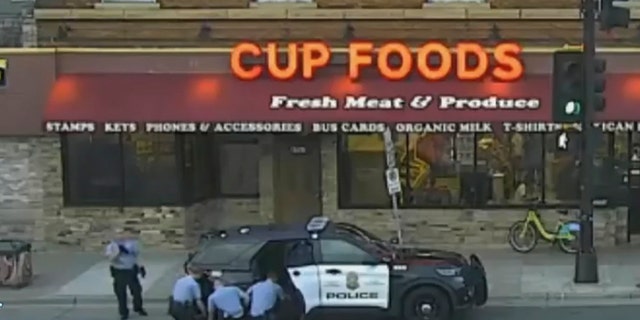
In this image from surveillance video, Minneapolis police Officers from left, Tou Thao, Derek Chauvin, J. Alexander Kueng and Thomas Lane are seen attempting to take George Floyd into custody in Minneapolis, Minn on May 25, 2020.
(Court TV via AP, Pool, File)
Thao stared directly at Chauvin and ignored bystanders’ pleas to help a man who was dying “right before their eyes,” Sertich said.
Kueng casually picked gravel from a police SUV’s tire as Chauvin “mocked George Floyd’s pleas by saying it took a heck of a lot of oxygen to keep talking,” she said.
And Lane voiced concerns that showed he knew Floyd was in distress but “did nothing to give Mr. Floyd the medical aid he knew Mr. Floyd so desperately needed,” the prosecutor said.
But attorneys for rookies Lane and Kueng urged jurors to question why their clients were charged at all.
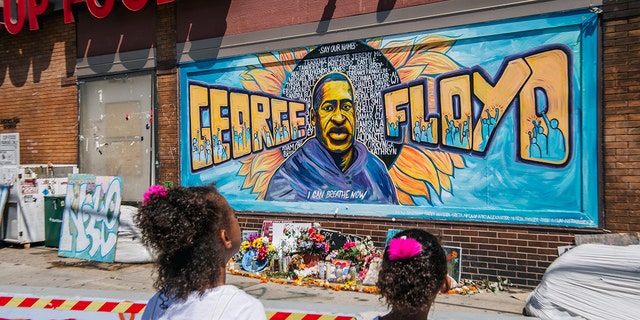
Jordan and Royal Pacheco learn of George Floyd’s murder at the intersection of 38th Street and Chicago Avenue, ahead of former Minneapolis police officer Derek Chauvin’s sentencing, on June 25, 2021 in Minneapolis, Minnesota.
(Photo by Brandon Bell/Getty Images)
OFFICER SAYS HE DIDN’T REALIZE GEORGE FLOYD’S LIFE WAS IN DANGER
Lane’s attorney, Earl Gray, said his client was “very concerned” about Floyd and suggested rolling him onto his side so he could breathe, but was rebuffed twice by Chauvin. He noted that Lane tried to help revive Floyd after an ambulance arrived, telling jurors that “any reasonable person should just be disgusted, should be infuriated” that Lane was charged.
Kueng’s attorney, Thomas Plunkett, said that Chauvin was in charge and that police weren’t adequately trained on the duty to intervene. He also said Kueng looked up to Chauvin, his former field training officer, and “relied on this person’s experience.”
“I’m not trying to say he wasn’t trained,” Plunkett said. “I’m saying the training was inadequate to help him see, perceive and understand what was happening here.”
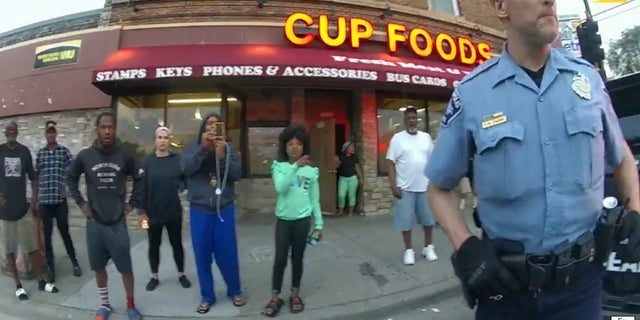
FILE – In this image from police body camera video former Minneapolis police Officer Derek Chauvin stands outside Cup Foods in Minneapolis, on May 25, 2020, with a crowd of onlookers behind him.
(Court TV via AP, Pool, File)
GEORGE FLOYD DEATH: MINNEAPOLIS POLICE OFFICERS’ CONDUCT ‘INCONSISTENT’ WITH DEPARTMENT POLICY, EXPERT SAYS
Thao and Chauvin went to the scene to help Kueng and Lane after they responded to a call that Floyd used a counterfeit $20 bill at a corner store. Floyd struggled with officers as they tried to put him in a police SUV.
Thao’s attorney, Robert Paule, said his client thought the officers were doing what they believed was best for Floyd — holding him until paramedics arrived.
The charges include language that the officers “willfully” deprived Floyd of his constitutional rights. That means jurors must find that officers acted “with a bad purpose or improper motive to disobey or disregard the law,” Paule said.
He noted that Thao increased the urgency of an ambulance call for Floyd, something he said was clearly “not for a bad purpose.” He also said that Thao reasonably believed Floyd was on drugs and needed to be restrained until medical assistance arrived.
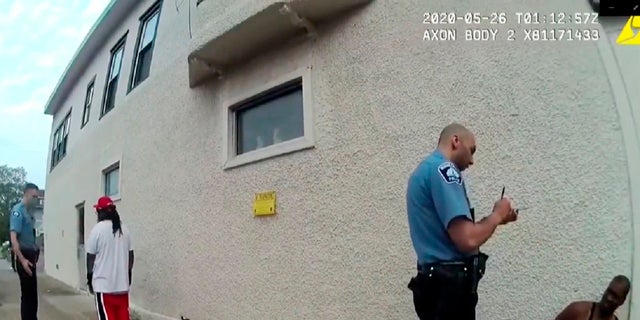
FILE – In this image from police body camera video shown as evidence in court, Minneapolis police Officers Thomas Lane, left, and J. Alexander Kueng, second from right, gather information as they take George Floyd into custody outside Cup Foods in Minneapolis, on May 25, 2020.
(Minneapolis Police Department via AP, File)
On the intervention charge, Sertich said, prosecutors merely had to prove that the officers knew the force Chauvin was using was unreasonable and that they had a duty to stop it but didn’t. On the charge that Floyd was denied medical care, the fact that the officers knew Floyd was in distress but did nothing is proof of willfulness, she said.
She pointed to the two and a half “precious minutes” after Floyd became unresponsive and before paramedics got there.
“They chose to do nothing, and their choice resulted in Mr. Floyd’s death,” she said.
Sertich contrasted the officers’ inaction with the desperate cries of bystanders pleading with them to get off Floyd and to check for a pulse.
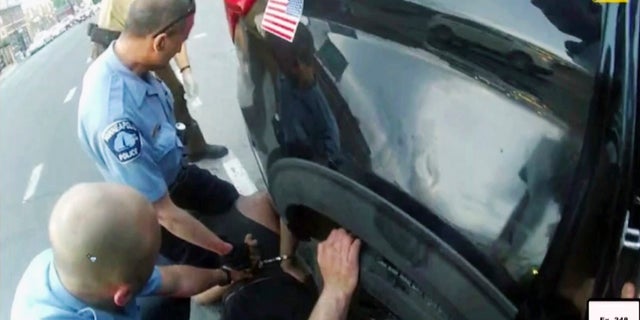
In this image from police body camera video shown as evidence in court, paramedics arrive as Minneapolis police officers, including Derick Chauvin, second from left, and J. Alexander Kueng restrain George Floyd in Minneapolis, on May 25, 2020.
(Minneapolis Police Department via AP, File)
Those bystanders, Sertich said, gave Thao and Kueng “play-by-play commentary” that should have raised their awareness that Floyd was in trouble.
Federal civil rights violations that result in death are punishable by up to life in prison or even death, but those sentences are extremely rare, and federal sentencing guidelines suggest the officers would get much less if convicted.
CLICK HERE TO GET THE FOX NEWS APP
Lane, who is White, Kueng, who is Black, and Thao, who is Hmong American, also face a separate trial in June on state charges alleging that they aided and abetted murder and manslaughter.
Chauvin pleaded guilty in the federal case in December, months after he was convicted of state murder and manslaughter charges.
Fox News’ Madelin Fuerste and The Associated Press contributed to this report.